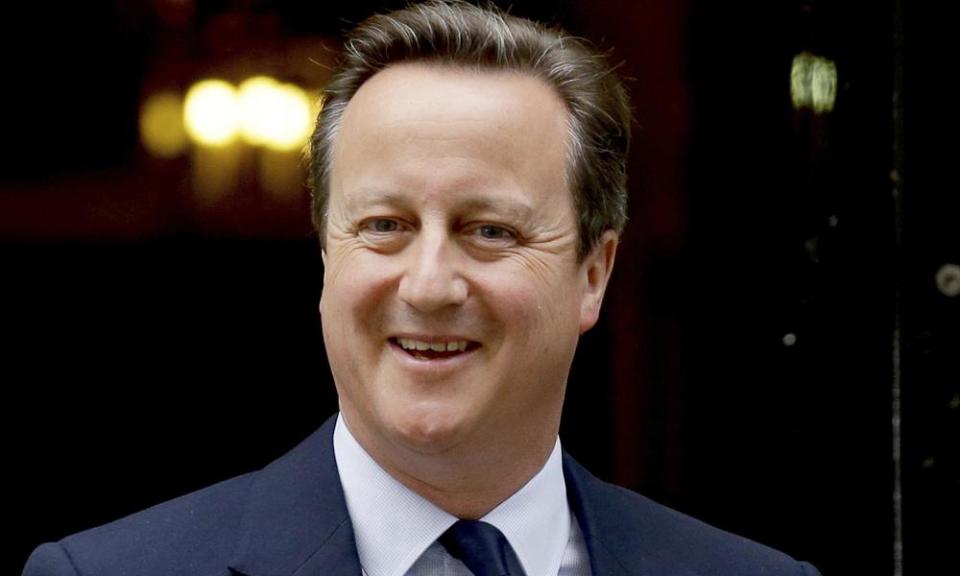Greensill scandal: government orders inquiry into Cameron lobbying

No 10 is to a launch an independent investigation into former prime minister David Cameron’s lobbying for the now-collapsed Greensill and the role of the scandal-hit financier Lex Greensill in government.
The independent review, commissioned by Boris Johnson, will be led by the legal expert Nigel Boardman, a non-executive board member of the Department for Business, Energy and Industrial Strategy.
It will look at the development and use of supply chain finance, offered by Greensill, and its associated activities in government, and the role Greensill played in those.
Johnson’s spokesman said there was “significant interest in this matter, so the PM has called for the review to ensure government is completely transparent about such activities, and that the public can see for themselves if good value was secured for taxpayers money”.
It is understood the review will look at Cameron’s lobbying after his time in government, with No 10 saying the inquiry “will also look at how contracts were secured and how business representatives engaged with government”.
Downing Street would not set out a timescale but said it would be expected to report relatively quickly. “The prime minister wants this to be done thoroughly and he wanted to be done promptly so you can expect a prompt return on this,” his spokesman said.
Bernard Jenkin, the Conservative MP who chairs the powerful liaison committee of MPs, had called for an immediate inquiry into Greensill’s influence in government during the Cameron administration, when he was brought in as an adviser, as well as changes to the ministers’ code of conduct to force them to declare when they have conversations about possible employment after their time in government.
Jenkin said the issue should be looked at immediately by the new advisor on ministerial interests. Johnson is yet to replace Alex Allan, who quit before Christmas after the prime minister backed the home secretary, Priti Patel, despite a highly critical report into bullying.
The former prime minister Gordon Brown has said lobbying rules should be tightened, as Labour called for Cameron to answer questions from MPs.
Brown said the spectacle of former prime ministers lobbying for private companies for personal gain “simply brings public service into disrepute”.
On Sunday, Cameron broke his month-long silence after a series of damaging stories about his lobbying efforts on behalf of Greensill, which included messages to the chancellor, two junior ministers, senior civil servants and a No 10 special adviser.
He said he had reflected on his conduct and accepted he should have communicated with the government “through only the most formal of channels”, and said there were “important lessons” to be learned.
Labour said there were “many serious questions” unanswered in his 1,700-word statement and demanded Cameron address them before parliament.
Brown suggested legislation banning high-profile politicians from such lobbying work for five years if the existing rules could not be made to work.
“For me there are principles about public service: it cannot ever become a platform for private gain,” he told BBC Radio 4’s Today programme. “Ministers must never be lobbying – former ministers, prime ministers, must never be lobbying for commercial purposes. Current ministers should not be entertaining such lobbying.
“If we can’t succeed in achieving this stopping by the sort of flexibility of the rules, we are going to have to pass laws to make sure that at least for, say, five years, no serving or former prime minister or minister is ever lobbying for any commercial purpose within government.”
The shadow chancellor of the duchy of Lancaster, Rachel Reeves, said: “Many serious questions remain unanswered and it is crucial that the former prime minister appears before parliament so that all the information is brought to light. Transparency and accountability are crucial and that requires the utmost openness from government to establish the full facts behind this scandal.”
Cameron repeatedly texted the chancellor, Rishi Sunak, asking him to grant Greensill Capital access to the Bank of England’s Covid corporate financing facility (CCFF). Texts released last week show Sunak telling Cameron he had “pushed the team to explore an alternative with the Bank that might work”. There was also a call between the pair.
While access to the CCFF was ultimately rebuffed, the National Audit Office is considering a request to investigate how Greensill Capital was later accredited to the coronavirus large business interruption loan scheme (CLBILS), handing it the ability to access government-backed loans of up to £50m.
Cameron said that despite his efforts it was clear the government did not wish to take up his proposals. “Ultimately, the outcome of the discussions I encouraged about how Greensill’s proposals might be included in the government’s CCFF initiative – and help in the wake of the coronavirus crisis – was that they were not taken up,” he said.
“So, I complied with the rules and my interventions did not lead to a change in the government’s approach to the CCFF.”
The health secretary, Matt Hancock, is also under mounting pressure to explain a meeting with Greensill, set up by Cameron who brought the company founder along with him to a “private drink”, according to the Sunday Times. There they are said to have lobbied Hancock to introduce a payment scheme that was later brought in for NHS staff.
In his statement, Cameron confirmed he met Saudi Arabia’s crown prince during a business trip with Greensill in January 2020, a little over a year after the murder of the Saudi journalist Jamal Khashoggi.
“While in Saudi Arabia I took the opportunity to raise concerns about human rights, as I always did when meeting the Saudi leadership when I was prime minister,” he said.
In February this year, US intelligence concluded that Crown Prince Mohammed bin Salman was likely to have approved an operation to kill or capture Khashoggi at the Saudi consulate in Istanbul.

 Yahoo News
Yahoo News 